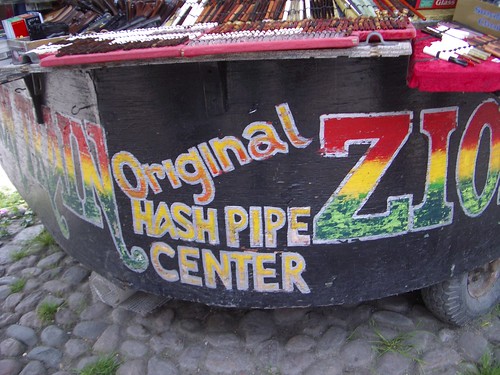 For Danes, the question is a fiery one, igniting on one side deeply held principles about freedom, nonconformity, and tolerance. A great number of Danes look to Christiania as the alter ego of the nation, and its right to exist is robustly defended. “In Denmark, everything is occupied and controlled. There’s not much space left in the cities, but Christiania is a kind of asylum. People feel more freer there than in the rest of the society,” says Rene Elley Karpantschof, a sociologist at the University of Copenhagen. But those opposed are fed up with the deeply rooted drug use, the land occupation, and the snubbing of laws. “It has been made a haven for criminals from neighboring countries, like Sweden or Norway,” says Jesper Nielsen, a cultural historian at Denmark’s National Museum. “So you could say they accept a criminal form of control within Christiania, but they resist control from without.”
For Danes, the question is a fiery one, igniting on one side deeply held principles about freedom, nonconformity, and tolerance. A great number of Danes look to Christiania as the alter ego of the nation, and its right to exist is robustly defended. “In Denmark, everything is occupied and controlled. There’s not much space left in the cities, but Christiania is a kind of asylum. People feel more freer there than in the rest of the society,” says Rene Elley Karpantschof, a sociologist at the University of Copenhagen. But those opposed are fed up with the deeply rooted drug use, the land occupation, and the snubbing of laws. “It has been made a haven for criminals from neighboring countries, like Sweden or Norway,” says Jesper Nielsen, a cultural historian at Denmark’s National Museum. “So you could say they accept a criminal form of control within Christiania, but they resist control from without.”Christiania, which takes its name from the Christhavn district in which it sits, began as a protest against the lack of affordable housing. The far left grandly championed the squatters. “Christiania is the land of settlers. It is so far the biggest opportunity to build up a society from scratch,” wrote well-known counterculture activist and journalist Jacob Ludvigsen as the squatters set up. Dilapidated army barracks were transformed into houses, and warehouses were outfitted with printing presses. Kindergartens were created, more houses built, stores and clinics opened, and a local post office was opened. No one paid utilities, rent, or taxes. Money was doled out equally, and smoking hash was as common as blinking. The “Freetown of Christiania” designed its own postage stamp, its own constitution, and its own flag. It had its own currency. It was known for its freewheeling lifestyle and funky, brightly painted houses.
“When I first came here, I was Red. I was for a revolution,” says Hjordis Oppedal, an artist who moved to Christiania in 1976 and maintains a studio there. “At first I didn’t like the drug users here, the addicts. But I realized all people have rights and I learned to keep an open mind.” Yet the hard drug use spiraled out of control, and an underworld of dealers swooped in to tap the growing market. What began as an anticapitalist utopia became a battleground of drug lords fighting for real estate. Police began regular raids on the drug-laden kiosks along Pusher Street, the commune’s main street.
Read more: The Christian Science Monitor


No comments:
Post a Comment